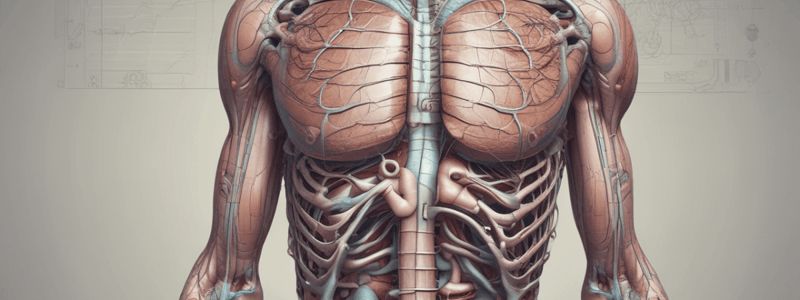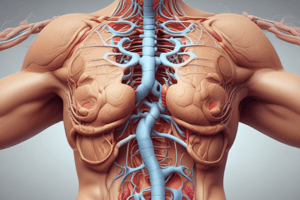Podcast
Questions and Answers
What is the primary function of the lesser omentum?
What is the primary function of the lesser omentum?
- Connecting the spleen to the diaphragm
- Attaching the stomach to the liver (correct)
- Holding the pancreas in place
- Supporting the small intestine
Which of the following is NOT a layer of the stomach wall?
Which of the following is NOT a layer of the stomach wall?
- Muscularis externa
- Adventitia (correct)
- Submucosa
- Mucosa
What is the relationship between the stomach and the spleen in terms of arterial supply?
What is the relationship between the stomach and the spleen in terms of arterial supply?
- The stomach is supplied by the splenic artery, while the spleen is supplied by the left gastric artery
- The stomach is supplied by the gastroduodenal artery, while the spleen is supplied by the splenic artery
- They share a common arterial supply from the celiac trunk (correct)
- The stomach and spleen have separate arterial supplies from different branches of the aorta
What is the term for enlargement of the spleen?
What is the term for enlargement of the spleen?
Which of the following nerves supplies the stomach?
Which of the following nerves supplies the stomach?
What is the normal position of the stomach in the abdominal cavity?
What is the normal position of the stomach in the abdominal cavity?
What is the primary function of the fundus in the stomach?
What is the primary function of the fundus in the stomach?
Which type of cell in the gastric glands produces somatostatin?
Which type of cell in the gastric glands produces somatostatin?
What is the primary function of gastrin in the pyloric antrum?
What is the primary function of gastrin in the pyloric antrum?
What is the main function of the pylorus?
What is the main function of the pylorus?
Which of the following is NOT a function of the body of the stomach?
Which of the following is NOT a function of the body of the stomach?
What is the result of failure to produce or utilize intrinsic factor?
What is the result of failure to produce or utilize intrinsic factor?
What is the primary function of the parietal cells in the gastric glands?
What is the primary function of the parietal cells in the gastric glands?
Which of the following is a characteristic of the pyloric antrum?
Which of the following is a characteristic of the pyloric antrum?
What is the function of the sphincter in the stomach?
What is the function of the sphincter in the stomach?
What is the lesser omentum connected to?
What is the lesser omentum connected to?
What is the purpose of the greater omentum?
What is the purpose of the greater omentum?
What is the name of the cavity formed by the posterior layer of the lesser sac?
What is the name of the cavity formed by the posterior layer of the lesser sac?
What is the outcome of the contraction of the sphincteric muscle?
What is the outcome of the contraction of the sphincteric muscle?
What is the location of the stomach in the abdominal cavity?
What is the location of the stomach in the abdominal cavity?
What is the term for the study of the examination of the abdomen for spleen enlargement?
What is the term for the study of the examination of the abdomen for spleen enlargement?
What is the name of the canal between the stomach and the duodenum?
What is the name of the canal between the stomach and the duodenum?
What is the vertebral level at which the coeliac trunk arises from the abdominal aorta?
What is the vertebral level at which the coeliac trunk arises from the abdominal aorta?
Which branch of the coeliac trunk supplies the liver?
Which branch of the coeliac trunk supplies the liver?
What is the characteristic of the splenic artery?
What is the characteristic of the splenic artery?
Which part of the stomach receives branches from the splenic artery?
Which part of the stomach receives branches from the splenic artery?
What is the purpose of the left gastric artery?
What is the purpose of the left gastric artery?
Why does the stomach receive branches from the common hepatic and splenic arteries?
Why does the stomach receive branches from the common hepatic and splenic arteries?
What is the significance of the coeliac trunk in the foregut?
What is the significance of the coeliac trunk in the foregut?
Which region of the stomach receives branches from the common hepatic artery?
Which region of the stomach receives branches from the common hepatic artery?
What is the effect of the greater splanchnic nerves on the intrinsic plexuses of the stomach?
What is the effect of the greater splanchnic nerves on the intrinsic plexuses of the stomach?
Where do the preganglionic sympathetic nerves synapse to reach the organs of the upper abdominal cavity?
Where do the preganglionic sympathetic nerves synapse to reach the organs of the upper abdominal cavity?
What is the term for the type of pain experienced in the epigastric region of the body wall, when the pain signal originates from the stomach?
What is the term for the type of pain experienced in the epigastric region of the body wall, when the pain signal originates from the stomach?
Which nerves carry the parasympathetic preganglionic fibres to the stomach?
Which nerves carry the parasympathetic preganglionic fibres to the stomach?
What is the location of the post-ganglionic parasympathetic nerves that supply the stomach?
What is the location of the post-ganglionic parasympathetic nerves that supply the stomach?
Which area of the body may also be involved in the referred pain from the stomach?
Which area of the body may also be involved in the referred pain from the stomach?
Flashcards are hidden until you start studying
Study Notes
The Stomach
- The stomach is an intraperitoneal organ located in the upper abdominal cavity.
- It has four parts: cardia, fundus, body, and pyloric region.
- The body of the stomach is a storage site for ingested food, broken down by hydrochloric acid and pepsinogen released from the stomach wall.
- Gastric glands in the body of the stomach contain goblet cells that secrete mucus, protecting the stomach wall from hydrochloric acid.
- Parietal cells secrete intrinsic factor, which helps absorb vitamin B12 in the intestine, and pepsinogen, which helps digest proteins.
- D cells secrete somatostatin, inhibiting acid secretion, while G cells stimulate acid secretion by producing gastrin.
The Pyloric Region
- The pyloric region consists of the pyloric antrum, pylorus, and pyloric canal.
- The pyloric antrum has a high proportion of gastrin-secreting cells, increasing the motility of the intestines.
- There is a lot of mixing and grinding of chyme in the pyloric antrum, with peristaltic waves pushing the chyme towards the pylorus.
- The pylorus contains a sphincter to control what leaves the antrum, formed by a ring of smooth muscle.
The Greater and Lesser Omentum
- The stomach is attached to the lesser curvature by the lesser omentum, which connects to the liver.
- The greater curvature of the stomach gives rise to the greater omentum.
The Wall of the Stomach
- The wall of the stomach consists of multiple layers.
The Relations of the Stomach
- The stomach has various relations, including the lesser sac.
Arterial Supply, Venous and Lymphatic Drainage of the Stomach and Spleen
- The coeliac trunk is the key artery of the foregut, supplying all of the upper abdominal organs.
- The coeliac trunk arises from the anterior aspect of the abdominal aorta, shortly after the aorta appears through the aortic opening in the diaphragm.
- The branches of the coeliac trunk include the common hepatic, splenic, and left gastric arteries.
- The lower half of the stomach takes branches from the common hepatic, while the upper half is mostly supplied by the splenic artery.
Nerve Supply of the Stomach
- The vagus nerves carry parasympathetic preganglionic fibers along the oesophagus and give branches to each of the organs.
- The post-ganglionic parasympathetic nerves are located in the walls of these organs.
- The left vagus nerve forms the anterior vagal trunk for the stomach, while the right vagus nerve forms the posterior vagal trunk.
The Spleen
- The spleen is an organ located in the upper abdominal cavity.
Note: These notes focus on the key points and facts presented in the original text, organized by topic.
Studying That Suits You
Use AI to generate personalized quizzes and flashcards to suit your learning preferences.




